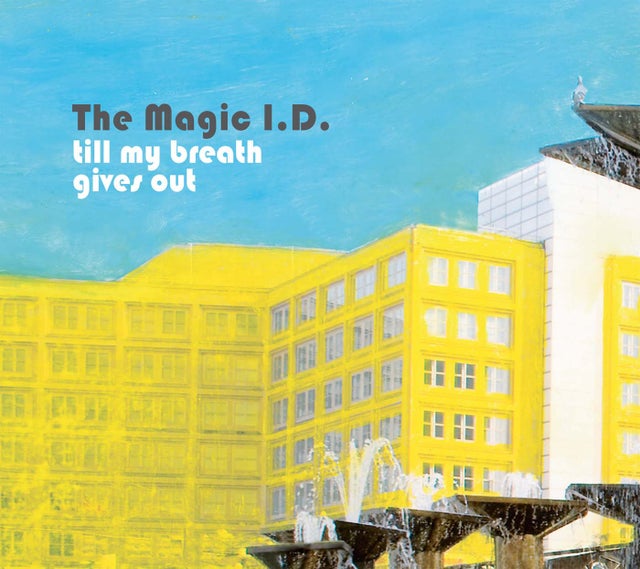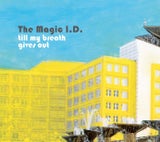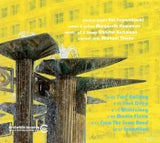- Kai Fagaschinski
- >
- The Magic I.D. - till my breath gives out (CD)
The Magic I.D. - till my breath gives out (CD)
SKU:
$14.00
$14.00
Unavailable
per item
ErstPop 001
The first release from erstwhile's 'pop' sub-label, with Vienna/Berlin-based four experimental musicians - Margareth Kammerer (vocals, guitar), Christof Kurzmann (vocals, g3, lloopp), Kai Fagaschinski (clarinet), and Michael Thieke (clarinet). Six-panel digipak, design by Marion Gerth.
For lossless (16/44) files, go to this page.
*LP is also available ($18). please contact us directly.
|
TRACK LIST
1. True Holiday (6:25) 2. Feet Deep (4:59) 3. Wintersong (6:14) 4. Martin Fierro (3:02) 5. From The Same Road (8:13) 6. Loopstück (12:57) (released January 31, 2008) CREDITS
recorded by Christoph Amann at Amann Studios, Vienna in November 2006 mixed and mastered by Christoph Amann and The Magic I.D. photography by Gianmarco Bresadola artwork by by Marion Gerth produced by Jon Abbey and Yuko Zama |
The Magic I.D. is a Berlin-based quartet exploring the juncture of song forms with abstract music. The band, consisting of Margareth Kammerer, Christof Kurzmann, Kai Fagaschinski and Michael Thieke, formed in summer 2005 after previously being connected via smaller groupings and projects. till my breath gives out is their debut release, and consists of six intricately constructed gems, each with its own individual shape, painstakingly sequenced to form a record that becomes more than the sum of its parts.
Kammerer was born in Italy and moved to Berlin in 1994. She is deeply involved in the worlds of both theatre and music, and has a lengthy resume in both areas. Her mostly solo album To Be An Animal Of Real Flesh was released on Charhizma in 2004, featuring collaborative tracks with Axel Dörner, Chris Abrahams and Tatusya Yoshida, as well as remixes from Fred Frith, Philip Jeck, Bernhard Fleischmann and Kurzmann. Her unique, distinctive voice has been underdocumented previously, but is showcased on till my breath gives out to riveting effect. Kurzmann has been a prominent part of both the Vienna and (more recently) the Berlin scenes over the past decade. As an organizer, he cofounded the phonoTAKTIK festival, helped found the famous Rhiz club in Vienna, and runs the prestigious Charhizma label. Kurzmann has been an essential part of many Erstwhile-related live events, in Tokyo, Berlin and NYC, and was the first to work at Amann Studios for an Erstwhile release, beginning a crucial relationship for the label. His duo with Burkhard Stangl, schnee, is one of the core projects of Erstwhile, with a third release for the label currently in preparation for release, and his duo with Ami Yoshida, a s o, is an underappreciated gem. Fagaschinski has leapt to prominence in the improv world over the last few years, with well-received duo projects such as Los Glissandinos (w/Klaus Filip), The International Nothing (w/Thieke) and Kommando Raumschiff Zitrone (w/Kurzmann). His music is rooted in abstraction, but with an increasingly insidious melodious element. This is his first Erstwhile release, and his second is already in the works, a duo disc with Stangl. Thieke was born in Düsseldorf and moved to Berlin in 1993. He works in a wide range of styles in the jazz and improv worlds, from a Mingus tribute to a collective trio on Ayler Records (w/Christian Weber and Michael Griener) to his own Unununium project on Charhizma to the aforementioned The International Nothing w/Fagaschinski, ranging from free blowing to sparse, pointillistic abstraction, from fully improvised to fully composed. The six pieces contained here are precise collective compositions, three by the full quartet, and one from each of the three potential “duos†(the two clarinets form one twinned instrument). till my breath gives out expands song forms through the prism of experimental sensibilities and meshes the two remarkably fluidly. The design has been sourced from a photograph taken by Gianmarco Bresadola in Alexanderplatz, Berlin, and stunningly reconceived by Berlin designer Marion Gerth. till my breath gives out is being released simultaneously in two formats: foldout digipak CD and gatefold 180g vinyl. The content and the running order are identical; the LP version was mastered slightly differently to better fit the format. The LP is an edition of 500 copies; the CD is unlimited and inexpensive. REVIEWS
John Eyles, All About Jazz The release of Till My Breath Gives Out caused something of a ripple to run through the ether—not an earthquake, but a sizeable ripple. The reason? Erstwhile Records, that bastion of "eai" (electroacoustic improv), has released a CD that purports to be pop, even going so far as to specially create a new imprint, Erstpop, for its release. Of course, it isn't actual pop (whatever that is!) but it is a long way from any previous Erstwhile release. The really surprising elements, and the ones that give it that "pop" label, are the prevalence of melody and vocals with lyrics. This release won't shock anyone familiar with Christof Kurzmann and Kai Fagaschinski's work on First Time I Ever Saw Your Face (Quincux, 2007); and if you aren't familiar with it, check it out. The combination of twin clarinets, subtle electronics and voices seems deceptively simple, but it makes a heady cocktail. The combined effect creates a unique soundscape; after hearing two seconds of this music, it could be mistaken for nothing else. Margareth Kammerer's voice is the trademark sound of the whole album, its focus. By turns, it is impassioned, then emotionally cool, then detached (in the style of Nico, say); but throughout it is highly expressive. In contrast, Kurzmann's own singing on "Wintersong" has a plaintive, haunting quality. Unexpectedly, this piece is strongly reminiscent of The Incredible String Band; it has the feel of a folk ballad, and the melody often sounds as if it is being invented in the moment. This is a recurring paradox of this music: the songs are finely crafted but also have a spontaneous, improvised feel. On "Martin Fierro," a ridiculously catchy song that truly justifies the "pop" tag, Kammerer and Kurzmann sing call-and-response, Kurzmann taking the verses, Kammerer the chorus; the results are utterly charming. Fine as they are, the vocals do not dominate the album. In fact, the final two tracks seem like completely instrumental pieces—only for vocals to appear in each as a delightful surprise, a surprise that recurs with each listen. Neither piece obeys the rules of any song form; rather they subtly subvert song form. On "From the Same Road," Kammerer only sings briefly, the piece being dominated by the beautiful melancholy of the clarinet. The closing track, "Loopstuck" (a wittily apt title), the longest at almost thirteen minutes, develops a repetitive, mesmeric quality in its first half, as a simple repeated (looped) passage of strummed guitar and low clarinet builds tension until one longs for release. The release eventually comes in the form of an understated recited verse from Kurzmann, followed by a chorus from Kammerer. This is a uniquely rich, strange album that deserves to be very influential. Phil Zampino, The Squid's Ear Erstwhile Record's first foray into "pop" music won't strike many as being in a pop mold, but it does extend the understated forms of electro-acoustic music into more embraceable yet still abstract song territory. lowercase song forms, you think? Not completely, but there are so many tonal and minimal aspects to this album that the comparison has to be made. It's probably more accurate to say that this blends the sensibility of minimal ea-improvisation with the avant/minimal compositional world, adding a song sensibility that understands and plays with popular form. The pieces have a strong use of dynamics and harmonics, with unconventional repetition and rhythm, a detached but clear vocal style, wielded with a subtle hand that implies the concentrative interaction of improvised music in conjunction with strong compositional skills. Michael Thieke is perhaps best known for his work with on the Creative Sources label, alone and in a quartet with label leader Ernesto Rodrigues; he's also a part of The International Nothing, another fascinating minimalist recording group which, not surprisingly, has all of the players on The Magic I.D. at one point or another. Clarinetist Kai Fagaschinksi has worked with vocalist and electronics artist Christof Kurzmann on their excellent duo record under the name Kommando Raumschiff Zitrone, First Time Ever I Saw Your Face, covering the Roberta Flack number of the same name, along with other songs of delicacy and a hint of space's massive vacuum. Kurzmann has also recorded with John Butcher on The Big Misunderstanding Between Hertz and Megahertz. Margareth Kammerer is also heard as a vocalist on Otomo Yoshihide's ONJO New Jazz Live Series 1 & 2. "True Holiday" opens till my breath gives out with a Kafka-esque quality of distant despair in the dual tonal clarinet work of Thieke and Fagaschinski. They practically birth the album in long coloured tones that suddenly break into Kammerer's impassive vocal, telling us that she can prove that we've met before. In fact, in an over-the-shoulder way, one almost shivers to feel that they've been listening to this song for years without ever noticing it. That implication is prominent, a distantly familiar soundscape and subdued words, ideational tales that carry an isolable openness; they simply make sense when you finally hear them. "Martin Fierro" is the most song-like of the album, backed by the strumming guitar of Margareth Kammerer. It's a pretty piece in its way, and acts as a bit of relief from the remote intensity of the balance of the songs. "Loopstuck" shows the stylistic border for this band, coming close to silliness in its plaintive sing-song quality, ultimately brought back by Kammerer's entrance with the warmly pale abstraction that makes these pieces work. "Wintersong" is an extraordinary example of what this band is capable of, Kurzmann's voice carrying a European pathos in a song that parallels the starkness of winter with the colourless march of nation states. The song evokes an Art Bears sensibility while only needing a hint of their instrumentation. The intensity of tones and their intersection makes a sort of pure tension that hunches your shoulders as though something were about to drop out of the sky, using urgent siren-like dissonance, disturbed thumping sounds, and electronically pulsing panic buttons. When the music breaks free of the instrumental section for the final lyric it leaves you expecting winter to wrap its frozen arms around you, a superb example of how less can be so much more. |



